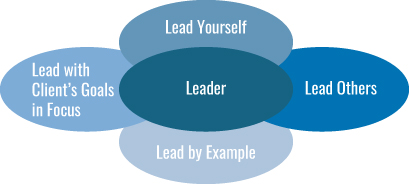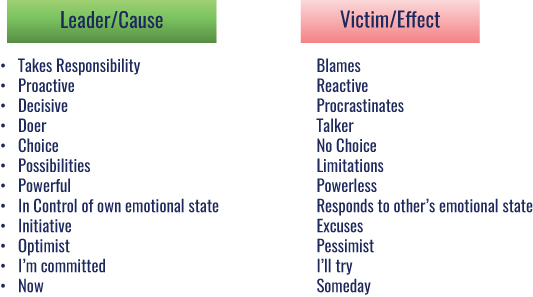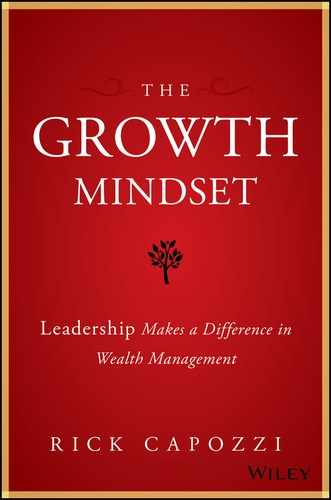Chapter 8
Managing Yourself and Taking Responsibility
“The way we spend our days is the way we spend our lives.”
—Annie Dillard
Self‐Care Creates Energy
If you can't manage yourself well, how can you objectively manage others and clients? And managing yourself starts with self‐care. Great leaders take care of themselves and, thus, they build their careers and their lives on solid foundations. They pay attention to small, everyday things. In my experience, living a healthy lifestyle is a prerequisite to being an effective advisor and leader. Having balance is key. The successful leaders featured in this book follow a daily regime of eating well, exercising regularly, getting enough sleep, and practicing mindfulness and some form of meditation. They know these everyday self‐care activities are essential to managing stress, depression, and anxiety and enhancing positive energy, productivity, and concentration. Taking care of yourself means also knowing who you are. One of my favorite self‐care books is The Brain Warrior's Way by Daniel G. Amen, MD, and Tana Amen, BSN, RN. It focuses on the interrelationships of energy, focus, moods, memory, weight, relationships, work, and overall health. So many of us are our own worst enemy. We get in the way of ourselves and we get stuck at times and cannot see the light right in front of us. Ralph Waldo Emerson said it well: “Most of the shadows of this life are caused by our standing in our own sunshine.” Positive everyday habits in your personal life help you foster positive habits in your professional life and will help you grow as a leader. Great leaders know this to be true.

Breaking Through
Bringing your “A game” starts by showing up on time and being well prepared. This might seem basic but I see people missing important meetings and opportunities because they didn't feel well or weren't fully prepared. If you are surprised by this fact, it's because you are not one of these people. In my estimation, over 50 percent of the people in the business miss the opportunity to execute on the fundamentals of their work just because they don't have the energy to do what is necessary on any given day. If you are not in the right state of mind, you're not going to ask for that introduction because you just don't feel you have that right energy, or the confidence if you get rejected. You tend to procrastinate more often than those who diligently follow good self‐care practices.
Since I travel a great deal, my foremost thoughts are about guarding my health. If I catch a cold or condition that prevents me from showing up and performing my responsibilities, it doesn't matter how good I may be. I'm not present. Thus, not showing up becomes my personal brand, and I may become known as someone who's not reliable. That's why in over 1200 presentations that I delivered all over the world I have never missed one or ever been late.
Ask yourself:
- Am I satisfied with my health?
- Am I getting enough sleep?
- Do I eat a well‐balanced diet?
- Do I make time for exercise?
- Do I make time for a mindfulness, religious, or spiritual practice?
If your answer to any of these questions is, “No,” ask yourself:
- Why not?
- Why do I not value my health?
Leaders practicing self‐care value not just their physical health, but also their emotional health. They take steps to reduce their anxiety and tension. It's difficult to perform at the top of your game professionally when you are off‐balance emotionally. Being tense inhibits your ability to notice the unexpected and reduces your opportunities to be a good listener. Being emotionally balanced will open up a world of possibilities and opportunities. Writing or talking about this is the easy part; the hard part is doing it because we all know that our circumstances can change in a second—family issues, health issues, and the daily challenges of taking care of our clients. Resilience and a healthy network of friends is the best way to stay on track and keep moving forward. In short, the secret is a few meaningful, loving, and trusting relationships and making good decisions about your health. You may need to change your relationship with food, people, time and beliefs. Again, it all starts with purpose. The motivation, the staying power.
Ask yourself:
- Am I emotionally well‐balanced?
- Do I spend most of my energy thinking about the past or future rather than focusing on the present?
- Do I hang onto regrets?
- What things contribute to my level of anxiety in my personal and professional life?
- How do the people in my life affect how I feel? How about the things I read or watch?
- What is my relationship with time? How do I prioritize and avoid procrastination?
- What are three specific things I can do to reduce stress and anxiety in my life?
Now take action!
“Keep close to nature's heart . . . and break clean away once in a while, and climb a mountain or spend a week in the woods. Wash your spirit clean.”
—John Muir
Energy is something that I pay more and more attention to as I get older. I'm always on the lookout for activities or experiences that give me good energy. For me, reading biographies or books on philosophy and being around positive and authentic people gives me energy. All aspects of Nature move me. I'm very fortunate to live on a beautiful five‐acre property where I can get my hands dirty by planting a tree or chopping wood or simply walk around paying attention to Nature. This experience is perfect and magical for me. Fall in love with Nature; it will always be there for you. Bask in the wonders it has to offer. To me, Nature is pure, it's truth, it's energy, it's growth, and it's life.
If your energy is not where you would like it to be, pay attention to the people in your life, what you read and watch, and your habits and lifestyle. Find what energizes you and cultivate it. Life is a marathon, not a sprint, so plan accordingly. Remember, you have the power of choice. If you want to be positive and happy, you need to make that a choice now. Don't base it on conditions (once X happens, then I'll do Y ). Your attitude will affect your business. If you fall for the trap of the “more” game, you will likely live a life of constant anxiety, which will affect your “long” game. The answer is balance, discipline, gratitude, joy, and love. Your choice.
Take Responsibility
“Success on any major scale requires you to accept responsibility. . . . In the final analysis, the one quality that all successful people have is the ability to take on responsibility.”
—Michael Korda
Ultimately, having the right energy is about taking responsibility for yourself, your decisions, and your destiny. At all stages of any career, lessons are often learned the hard way. Leaders, even the most admired ones, aren't flawless. More often than not, leaders who own their mistakes and failures and learn from these experiences are the ones who are most admired. Leaders are not victims; they don't make excuses. Leaders with a growth mindset take responsibility for their past, present, and future.
“Ninety‐nine percent of all failures come from people who have a habit of making excuses.”
—George Washington Carver
Wishful thinking does not move you forward. The only way you can control your destiny is by taking full responsibility for it. When you take full responsibility, you must deal with what is in front of you. In other words, you must accept the truth of your reality.
Let's say you have a boss, advisor, or partner with whom, for some reason, you don't get along. Things just get worse over the years, but you keep wishing he would change or treat you differently. The relationship is less than ideal. Face the reality and make your decisions based on that reality. If someone on your team is not living a healthy lifestyle and it's affecting the business, take some of the initiative and do something about it. You may have two clients who are a poor fit to your business model. Perhaps they constantly question your value, or are always complaining. Take responsibility for the situation and make a decision to do something about it.
“I am the product of my decisions, not my circumstances.”
—Stephen Covey
Consider this when faced with a difficult situation:
- Acknowledge the situation: “I don't get along with my partner.”
- Take responsibility for the situation: “Is there anything I can do to change the relationship?”
- Identify possible actions: “I will be more assertive about my boundaries and expectations. I will talk with her honestly and respectfully about our issues and see if we can figure out a way to make it better.”
- Do it.
“I have not failed. I've just found 10,000 ways that won't work.”
—Thomas A. Edison
By initiating the conversation, you are taking responsibility for the situation and taking leadership in finding a solution. You may fail, but that's okay. As a leader, you take responsibility for the failure. You carefully consider the lessons you learned from the experience. You will use these lessons to move forward. The cornerstone of a growth mindset starts with taking responsibility, because you create, promote, or allow what goes on in your environment. The first time I heard that idea was while I was attending an executive leadership course at the University of Virginia Darden School of Business. Professor Weber shared it with the attendees and it didn't quite hit me until I got back to the office.
When I was running a region, one of the managers in my region in New England had a pattern of treating people with disrespect. At the time, I would say to myself, “I didn't create this manager since I didn't hire him nor do I tolerate this form of behavior from him or anyone else.” However, by keeping him on board, I allowed this pattern of behavior to persist. That was absolutely my responsibility. Taking full responsibility is not only about seeing right from wrong but also acting to do the right thing. If you or someone in your operation or home office makes a mistake, you should quickly take full responsibility no matter what. Even if the client is unlikely to learn of the error, you must always be transparent with him. The client is doing business with you—don't try to deflect the blame on the asset manager or your assistant or junior partner. Own it right away.
Ask yourself:
- What negative patterns am I creating or allowing in my life or business that aren't good for me and the people I care about?
- What am I creating that's positive?
- What am I promoting that's positive or negative to everyone around me?
That self‐awareness we discussed earlier in the book is very useful in helping you to honestly answer these questions.
That last question—what are you promoting, creating and allowing. Allowing is the one most people don't acknowledge responsibility for. So, what are you allowing that's not good for the long‐term success of you and your clients and everything that you care about? I'll give you a few examples to get you started.
- Do you allow your team to disrespect each other and as a result they don't work well together?
- Do you allow one person to control or manipulate you?
- Do you allow the person to whom you report to treat you unfairly or disrespectfully?
- Do you condone a team member who is not fully prepared or not knowledgeable on a topic she is expected to understand?
- Do you allow yourself to become complacent?
- Do you allow a few people in your office to create an unpleasant environment for everyone?
- Are you allowing one person to hijack a meeting?
“The price of greatness is responsibility.”
—Winston Churchill
At the end, if you can't lead yourself successfully you certainly can't lead others effectively.

The only thing that stands between a man and what he wants from life is often merely the will to try it and the faith to believe that it is possible. —David Viscott
